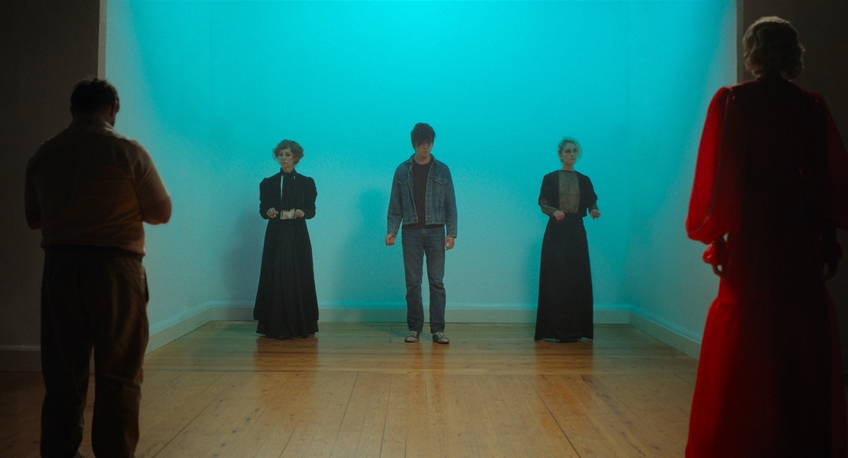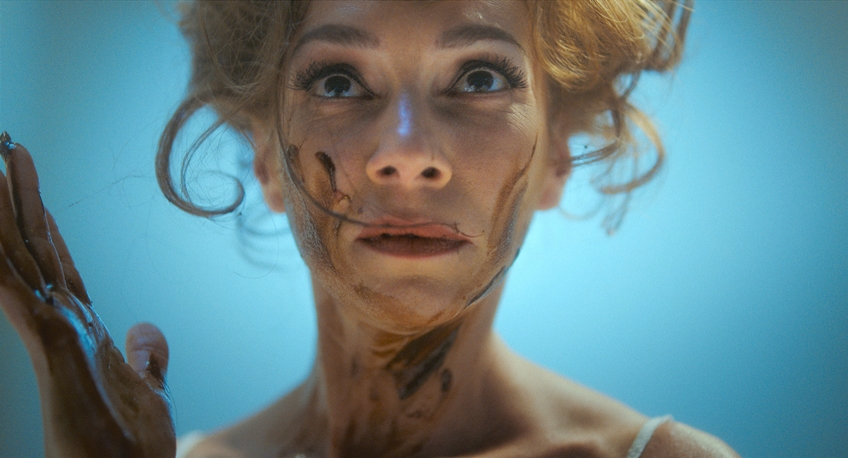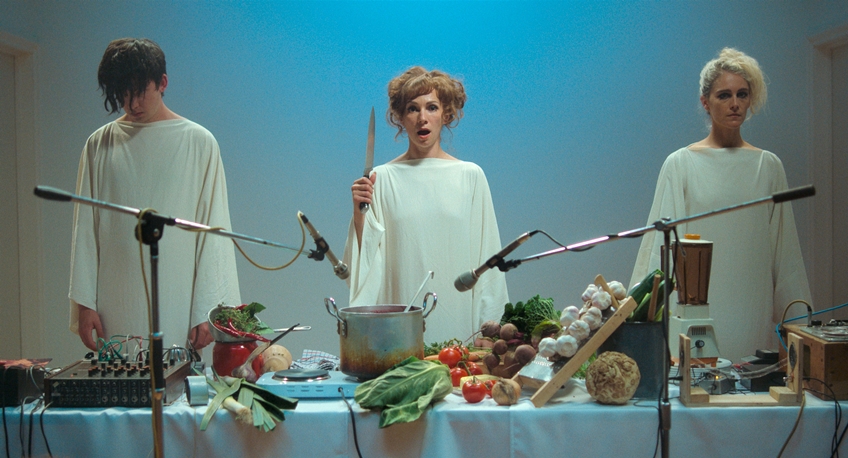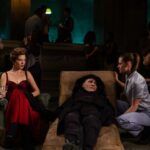Joyce Glasser reviews Flux Gourmet (September 30, 2022) Cert 15, 111 mins.
David Cronenberg (whose Crimes of the Future is on release) notwithstanding, for anyone other than writer-director Peter Strickland, or the characters in his new film Flux Gourmet, the title will be an oxymoron. Audiences will be attracted to the word, “Gourmet,” salivating at the memories of films such as Gabriel Axel’s sumptuous Babette’s Feast, Ang Lee’s tasty Eat, Drink, Man Woman or Nora Ephron’s lip-smacking Julie and Julia. But before booking dinner reservations, consider the medical definition of the word “Flux”: “an abnormal discharge of blood or other matter from or within the body.” That is the apt definition in Strickland’s unappetising satire of something: perhaps arcane art house movies like this one.
A misleading title was what trips up Toby Jones when his character, an uptight British sound recordist, arrives for a job at an Italian sound studio in Strickland’s 2012 film, The Berberian Sound Studio. Believing The Equestrian Vortex to be a movie about horses, he learns it is a Giallo, a slasher/horror movie, which starts asking too much of its exploited cast, not to mention its increasingly disturbed sound recordist. The soundtrack for the film was composed by Broadcast, a cult band that blends pop and experimental electronic music to create the dissonant sounds of psychedelia that was nostalgic in a subliminal level. Form and content merge as audiences learn all about the sound effects of films that affect your mental health.
After the excellent In Fabric, a film whose strangeness was combined with surprising pathos, human emotion and a frightening plot or two, with Flux Gourmet Strickland returns to esoteric recording worlds. His film is set in the Sonic Catering Institute where a highly specialised “creative” residency, led by Elle di Elle (Fatma Mohamad) is taking place over three weeks. If you say her name out loud it reads, LDL, the bad type of cholesterol, but Strickland plays with names, too. Mohamad has been in every one of Strickland’s five films and overacts, as she did in In Fabric, although in fairness, the stylised acting here is intrinsic to the ritualistic action.

There is friction between the certifiable director, Jan Stevens (Gwendoline Christie), and Elle di Elle as well as the other performance artists. Stevens is big on rules but is carrying on an unusual sexual relationship with the young, single and troubled performance artist Billy Rubin (Asa Butterfield), to whom she is overly attached.
But the protagonist whose unheroic and unedifying journey we are following is an outsider, symbolically named Stones (Makis Papadimitriou). He is a Greek national and hack writer hired by the Institute to document the residency. This is a gimmick to have a narrator – not the most annoying part of the film, but one of them – and, for the audience’s benefit, an outsider who reacts to and interacts with the performances.
Stones, however, is not just any hack. Dumpy, frumpy, smelly and unshaven, he suffers from a gastrointestinal condition that has him walking around the grounds of the Institute farting and, at night, making frequent prolonged trips to the toilet. This is such a well-funded institute that there is a dedicated physician on site, Dr Glock (Richard Bremmer) to diagnose Stones’ illness and then attempt a curative measure as part of the group’s performance.
Elle di Elle’s increasingly outrageous acts are even alienating her lover Lamina (Ariane Labed). In one starring role, she takes a stool sample in a plastic medical tube (clearly Stones’) and, playing, on the similarity with chocolate, smears it over her face.

There is an appreciative audience of well-heeled spectators who mingle in the Green Room to hobnob with the artists after being sexually stimulated by the performance.
By now, Stones’ is so integrated into the group that he allows himself to take centre stage in his own Colonoscopy. This is the closest the film comes to Cronenberg’s Crimes of the Future, set not in an institute, but in a future world where people buy tickets to see competing artists have unusual internal organs extracted. The audiences are sexually stimulated by the sado-masochistic spectacle.
But Strickland is way ahead of Cronenberg when it comes to the kind of self-indulgence that alienates an audience and risks boring it to tears. Not only is there no tension or plot to speak of, but Strickland’s style is so self-conscious and his characters so uninteresting and unbelievable that we have no stake the film. The gross out scenes are not integrated into a story but feel gratuitous, there to shock.
In the production notes is a clue to what Strickland could be satirising. Long before making The Berberian Sound Studio, Strickland took a break from making short films and joined the Sonic Catering Band, a group that made music from the sounds of preparing and cooking food. Tracks include Prelude to an Empty Stomach, March of the Incisors and Dada Cuisine.
Were there appreciative audiences waiting at the door to befriend the performers? This elitist entertainment is such a niche taste that sending it up can only baffle those who do not know such bands exist. And when the satire is so physically revolting that only the odd six-year-old might find it funny, the entertainment value of any satire is questionable.




